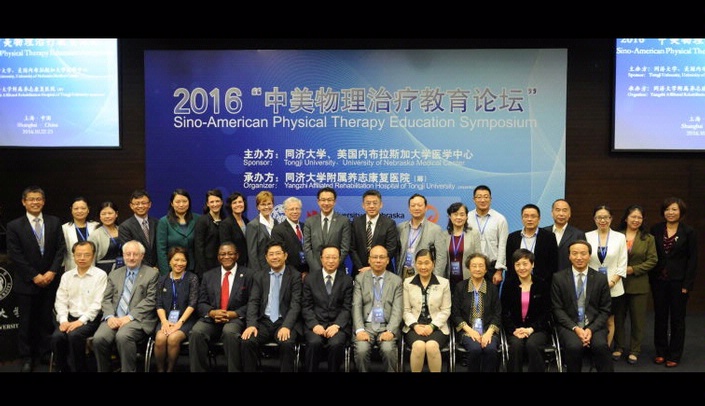October is a hectic month at UNMC. Students face midterms, faculty have grading and grant applications, some staff are busy recruiting next year’s students. For a few faculty and administrators at UNMC, October means trips to China.
This series of three articles is about important elements of these trips. This article is about education at symposia and workshops. The first article, on recruitment, was published earlier. The final article, on connections with our partner institutions, will be posted later.
Education is key to extending our mission to Asia. For several years, faculty from the University of Nebraska Medical Center have shared their expertise in the areas of Family Medicine and Physical Therapy with healthcare practitioners in China. This is because the Chinese government has identified these areas as essential to reforming healthcare in China. One way they share this expertise is through annual symposia and workshops for healthcare practitioners.
Physical Therapy Symposium and Workshop
On October 22, College of Allied Health Professions faculty presented at the First Sino-American Physical Therapy Symposium in Shanghai. Kyle Meyer, Ph.D., dean of the College of Allied Health Professions, and Joseph Norman, Ph.D., program director for physical therapy education offered keynote speeches. They were joined by Yu-Ling Wang, Ph.D., director of rehabilitation medicine at the sixth affiliated hospital of Sun Yat-Sen University.
Following the opening remarks, several speakers from UNMC and China gave individual presentations. After that, a panel of physical therapy experts from UNMC, China, Taiwan, and Australia discussed the challenges facing physical therapy education in China. These include "establishing physical therapy programs, setting up successful clinical education, and a shortage of physical therapy education faculty," said Joseph Siu, Ph.D., associate professor of physical therapy education at UNMC. Siu chaired the panel. Almost 120 people attended the physical therapy symposium.
The following day, UNMC faculty led a physical therapy workshop, which focused on clinical education. It was attended by more than 50 people.
Siu said, "I believe that this PT education symposium is just the beginning to simulate ideas to advance PT education in China. As a UNMC PT faculty, I am excited to be part of it. PT educators in China along with PT faculty at UNMC will meet again in the near future in China to elaborate on the discussion of PT education enhancement, clinical education development, students learning experience, and more."
Family Medicine Symposium and Workshop
A few days later, on October 24 and 25, leadership and faculty from the College of Medicine led the Family Medicine Symposium in Shanghai. This symposium has been held annually since 2010. Thousands of medical practitioners have been trained since then.
This year presenters discussed ACGME-I accreditation, institutional requirements (DIO, GMEC, sponsoring institution), common program requirements, family medicine program requirements, the learning environment, core competencies (MK, PC, Comm, PBLI, SBP, Prof), and how a primary care clinic functions in the U.S.
The impact of these symposia and workshops extends far beyond those present. This is because the main goal of these symposia and workshops is to train the current and future leaders in family medicine and physical therapy. Jeffrey Harrison, M.D., vice chairperson of the Department of Family Medicine, says "training the leaders of tomorrow is perhaps the biggest impact we can make on healthcare in China."
